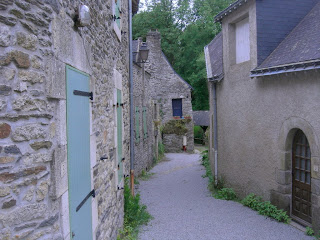Rochefort-en-terre
In the twelfth, century the hill town of Rochefort-en-terre was a relatively well to do canton, surviving as it did, due to the patronage of the highly placed administrators, the rich bourgoisie and seigneurs all vying for power and influence in the region

At the end of the first french regime, however, the town went through a long period of decline which even it's sole source of income, slate selling, failed to halt

Coupled with the inability of the old town to adapt, it's mistrustfulness towards the changing times and the lack, quite simply, of any ressources to modernise itself over the last two centuries, the town has remained firmly locked in the time capsule of it's heyday

The narrow streets tightly hugging the ancient stone and slate houses, all neatly lined up and in some cases stuck next to each other are all still marvelously intact which has led, unsurprisingly, to a boon in the local tourist industry






Notre Dame de La Tronchaye
At the start of the twelfth century as the powerful Rochefort fmilly took up residence at the top of the hill, a shepheard discovered an ancient statue of Mary the Virgin hidden in a hollwed out tree. According to popular tradition, the statue was hidden 200 years beforehand by a friar who was fearful of the Normand invasion.

Over the course of the century, a church was built on the site of the discovery but in the sixteenth century, it was partly demolished to be replaced by a church of a more gothic style
La forteresse des Rochefort
After the victory of the King of France over the Bretons, he orderd the destruction of the fortresses in the region.

Rebuilt by Guyonne La Folle, the chateau was again destroyed in 1594, victim of the religious wars. Then, for a third and last time the fortress was completely destroyed in 1793 by the republican army - following an uprising it had been occupied by the paysans who were hostile to the ongoing conscription

Today, the only remaining vestiges of the symbol of the power and the richess of the seigneurs Rochefort, is the fortified wall which surround the spur of the hill


At the end of the first french regime, however, the town went through a long period of decline which even it's sole source of income, slate selling, failed to halt

Coupled with the inability of the old town to adapt, it's mistrustfulness towards the changing times and the lack, quite simply, of any ressources to modernise itself over the last two centuries, the town has remained firmly locked in the time capsule of it's heyday

The narrow streets tightly hugging the ancient stone and slate houses, all neatly lined up and in some cases stuck next to each other are all still marvelously intact which has led, unsurprisingly, to a boon in the local tourist industry






Notre Dame de La Tronchaye
At the start of the twelfth century as the powerful Rochefort fmilly took up residence at the top of the hill, a shepheard discovered an ancient statue of Mary the Virgin hidden in a hollwed out tree. According to popular tradition, the statue was hidden 200 years beforehand by a friar who was fearful of the Normand invasion.

Over the course of the century, a church was built on the site of the discovery but in the sixteenth century, it was partly demolished to be replaced by a church of a more gothic style
La forteresse des Rochefort
After the victory of the King of France over the Bretons, he orderd the destruction of the fortresses in the region.

Rebuilt by Guyonne La Folle, the chateau was again destroyed in 1594, victim of the religious wars. Then, for a third and last time the fortress was completely destroyed in 1793 by the republican army - following an uprising it had been occupied by the paysans who were hostile to the ongoing conscription

Today, the only remaining vestiges of the symbol of the power and the richess of the seigneurs Rochefort, is the fortified wall which surround the spur of the hill

Libellés : France, Rochefort-en-terre













0 Comments:
Enregistrer un commentaire
<< Home